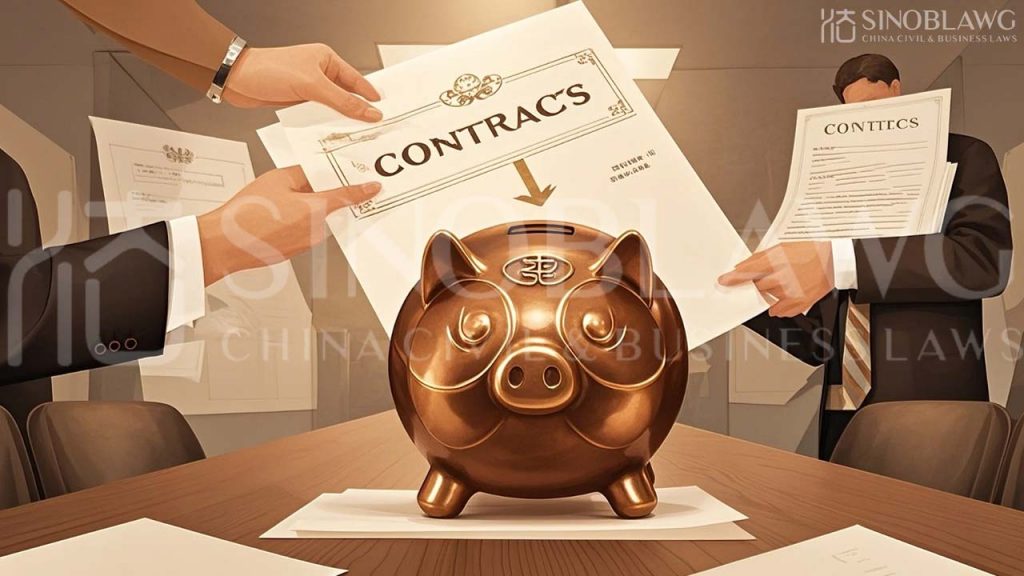A typical contract dispute is that one party unilaterally rescinds a valid contract by serving a termination notice to the other party citing some or no reasons. This drastic action often causes turmoil and substantial loss to the other party.
What can the non-terminating party do when caught in such a situation under Chinese contract laws? The answer is not a ready one to give. Indeed, there has been quite some confusion in relation to this part of law and its application in judicial practice.
I. The Law and Judicial Interpretation
Article 96 of China Contract Law:
当事人一方依照本法第九十三条第二款、第九十四条的规定主张解除合同的,应当通知对方。合同自通知到达对方时解除。对方有异议的,可以请求人民法院或者仲裁机构确认解除合同的效力。
法律、行政法规规定解除合同应当办理批准、登记等手续的,依照其规定。
The party availing itself of termination of a contract in accordance with Paragraph 2 of Article 93 and Article 94 hereof shall notify the other party. The contract is terminated when the notice reaches the other party. If the other party objects to the termination, the terminating party may petition the People’s Court or an arbitration institution to affirm the validity of the termination.
Where termination of a contract is subject to any procedure such as approval or registration, etc. as required by a relevant law or administrative regulation, such provision applies.
Here, when one party notifies the other party of termination of contract in accordance with paragraph 2 of Article 93 and Article 94, then the contract shall be terminated at the time of arriving of termination notice to the other party. If the other party disagrees, it can challenge the termination by taking the issue to People’s court or arbitration commission.
In this Article, the law does not provide for any time limitation on raising the challenge to the termination attempt. So in practice, the other party may simply reply in writing expressing disagreement to the termination. It does not have to go to court to make waves.
However, noticing that the delay of the other party to challenge the termination action of the first-said party may keep the legal relationship between the parties unsteady, in May, 2009, China Supreme Court emboldened itself again to provide in its second interpretation of China Contract Law that:
where the party objecting to the termination by the other party in accordance with Article 96 of China Contract Law only challenges the termination and initiates the lawsuit after expiry of the agreed period of challenge, the people’s court won’t support its efforts; absent the agreed period of challenge by the parties, the party initiates the lawsuit after three months of arrival of the termination notice, the people’s court won’t support its efforts.
当事人对合同法第九十六条、第九十九条规定的合同解除或者债务抵销虽有异议,但在约定的异议期限届满后才提出异议并向人民法院起诉的,人民法院不予支持;当事人没有约定异议期间,在解除合同或者债务抵销通知到达之日起三个月以后才向人民法院起诉的,人民法院不予支持。
Here, China Supreme Court’s interpretation has gone beyond its supposed boundary to actually make new law by imposing a “period of challenge/objection” time limitation on the non-terminating party to challenge the termination notice. If the non-terminating party fails to sue within the agreed period of challenge or three months in case of no agreed period of challenge, then the people’s court won’t support its claim of invalidating the termination (or equally keep the validity of the contract) or claim for real performance. In other words, with the passing by of the period of challenge, if the non-terminating party does not sue within that period, then the contract is therefore terminated legally.
II. The Questions and Confusion
Now the imposition of “period of challenge/objection” has caused a lot of confusion in cases involving contract termination disputes.
Hypothetical Case: Seller sells its real estate property to a buyer under a property sale contract, but the parties didn’t stipulate any period of challenge in the case of unilateral termination by one party. After some time, the property market gets hotter, the same property can be sold at a much higher price, and the seller wants to terminate the sale contract and then sell the same property to others, so he came up with an excuse of whatever nature and sent a termination notice to the other party. The buyer did send a written reply challenging the termination attempt by the seller. The parties then were engaged in some talks without a mutually acceptable settlement. After three months of the termination letter, the buyer sued the seller for real performance.
The court has to answer the following questions:
(1) upon receiving the termination notice, will a written reply objecting to the termination suffice in striking back the termination? or will the buyer have to sue to the challenge the termination attempt?
(2) since the case is initiated after three months, will the court still need to review the substantive ground of the seller’s termination or simply rule in favor of seller on the ground of expiry of the period of challenge?
(3) is the contract still terminated if the seller is found to have no legal ground to terminate upon substantive review by court?
There are a great slew of articles discussing the issues. Unfortunately, people are widely divided and many of these people are judges from different courts.
III. My Idea
When caught in such a delicate situation, the non-terminating party shall be very careful and discreet in taking action to respond to the termination notice.
The best bet will be taking action to sue within three months or the agreed period of challenge unless your circumstances compel otherwise. In addition to the lawsuit, you’d be better off to send a written reply to challenge but what should be written in the reply is important and critical which can only be decided in consideration of your case conditions.
There are more issues to be considered in such a situation: should the non-terminating party continue to perform the contract after receiving the termination notice, what claims should the non-terminating make in its lawsuit, what remedies the non-terminating party has if the contract is ruled to terminate upon termination notice.
All these issues shall be closed examined in light of the facts and conditions of your case.
[The above written or any part of it shall not constitute valid legal advice and I and our firm will not take responsibility for your action in reliance on the contents in this article.]








Comments